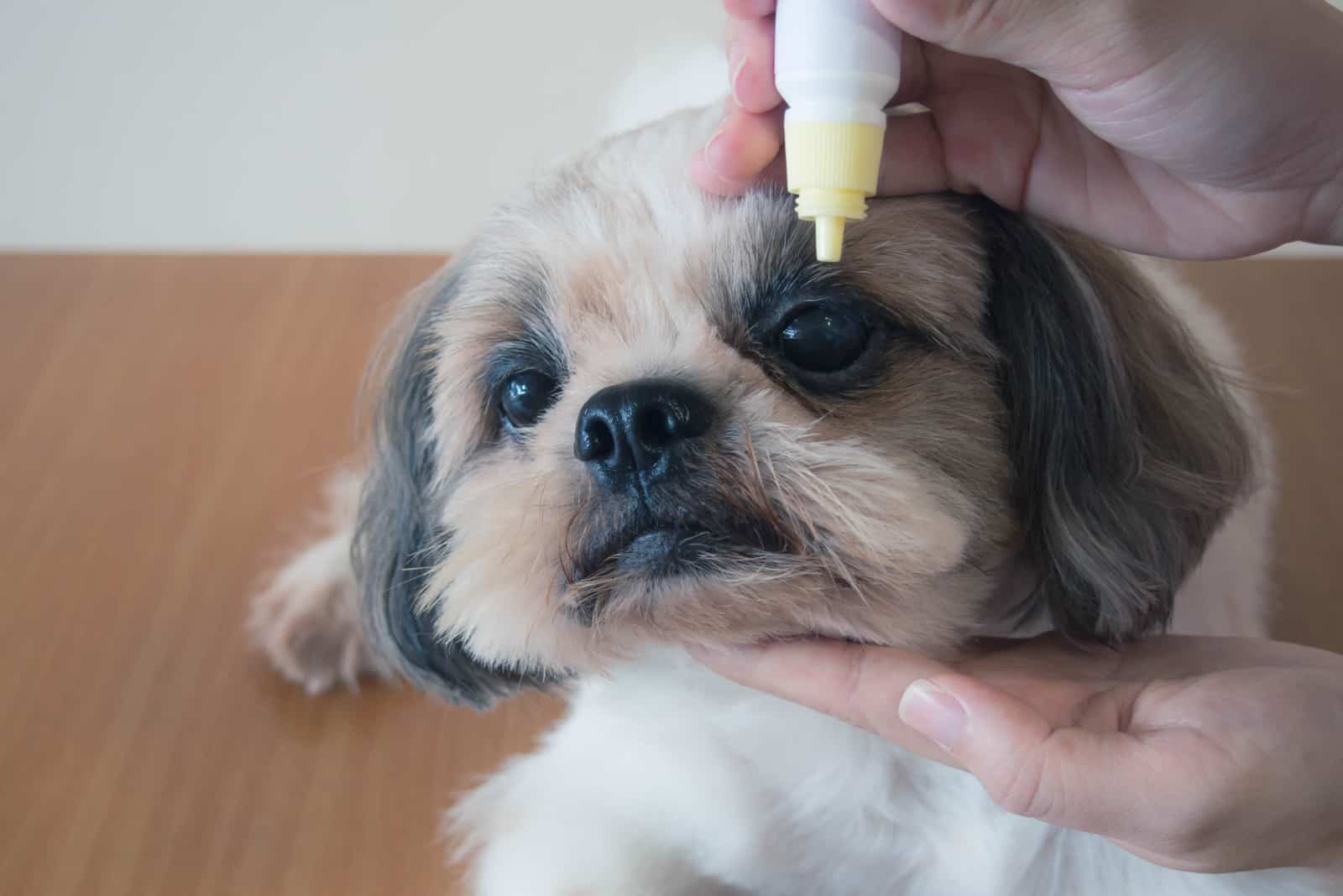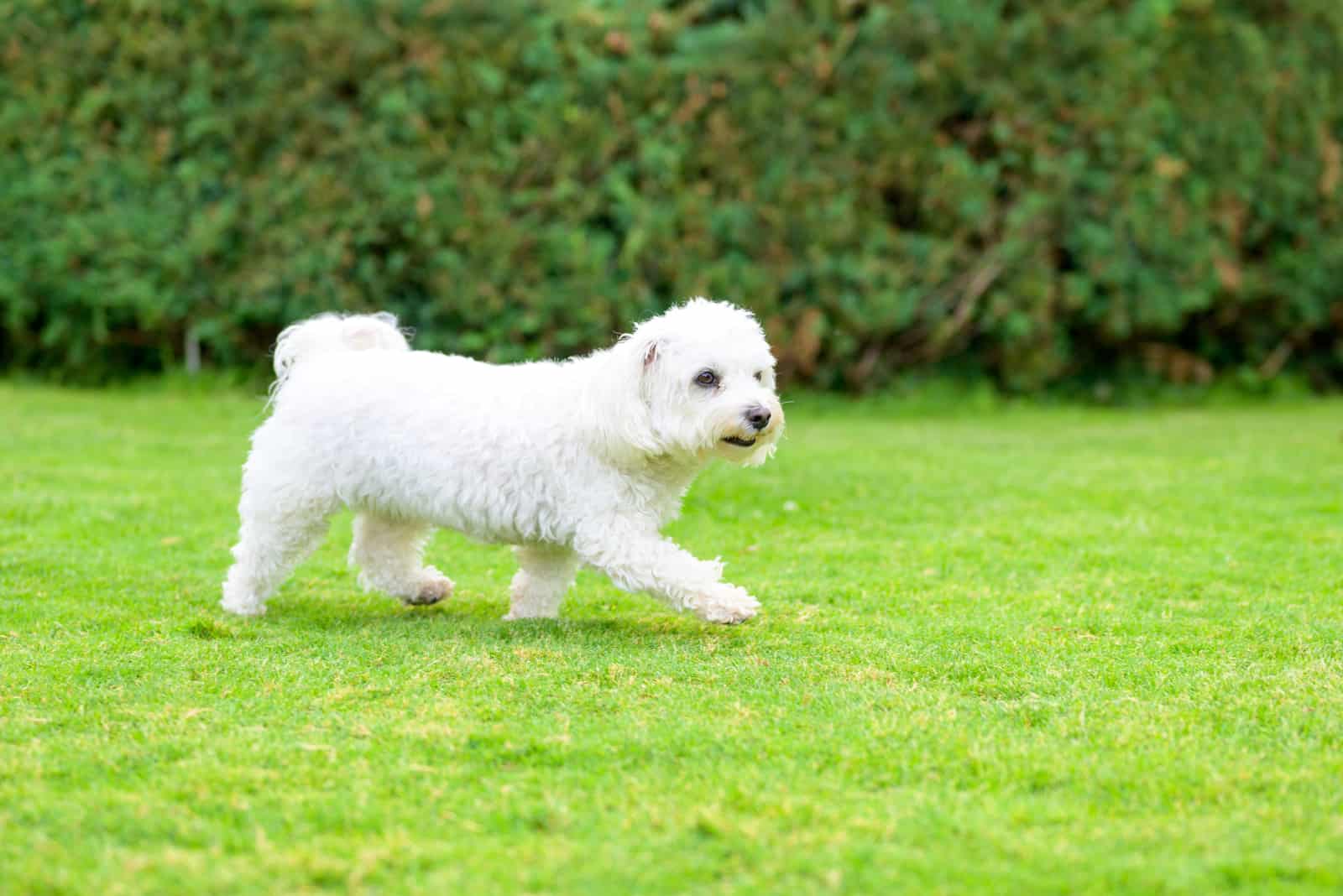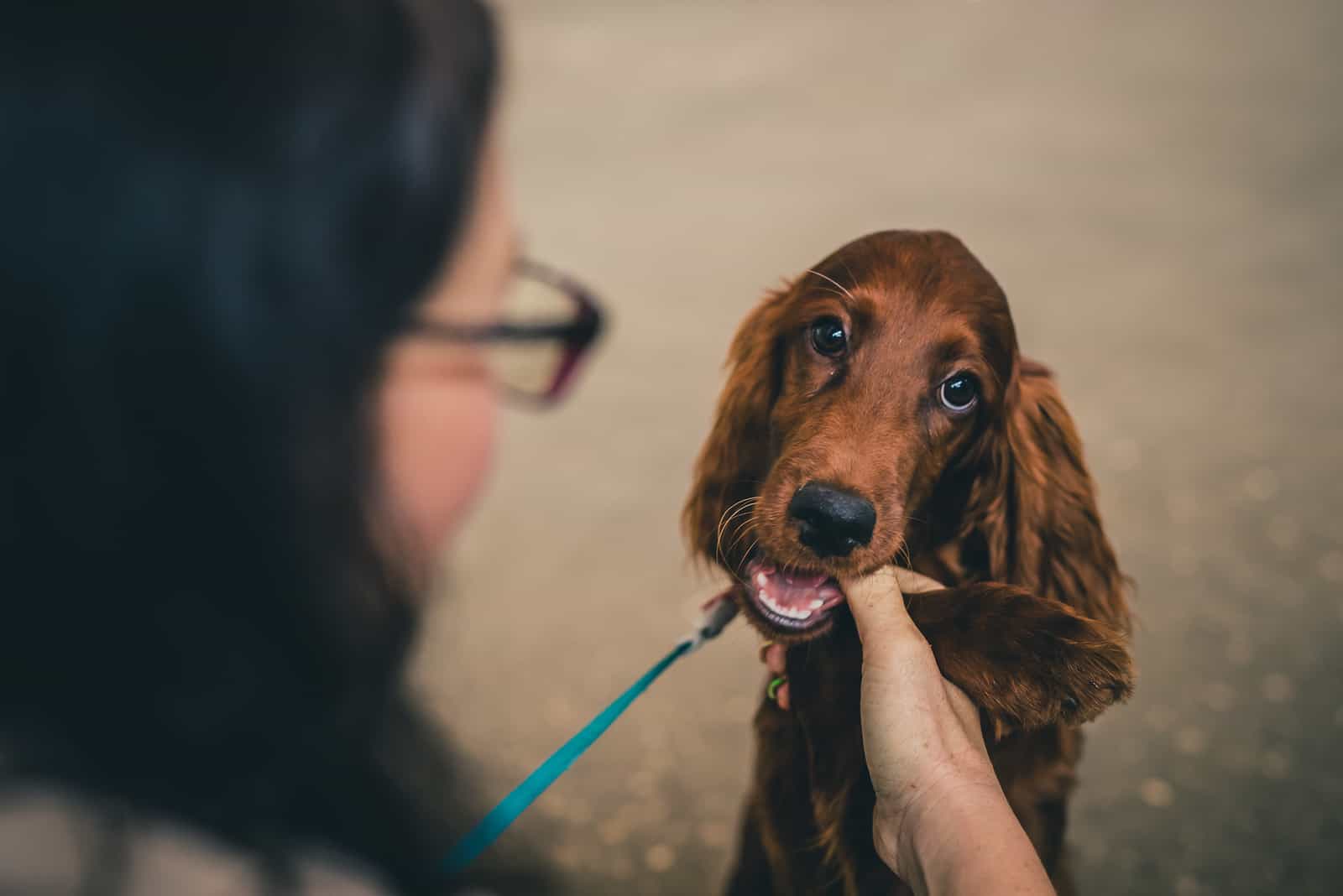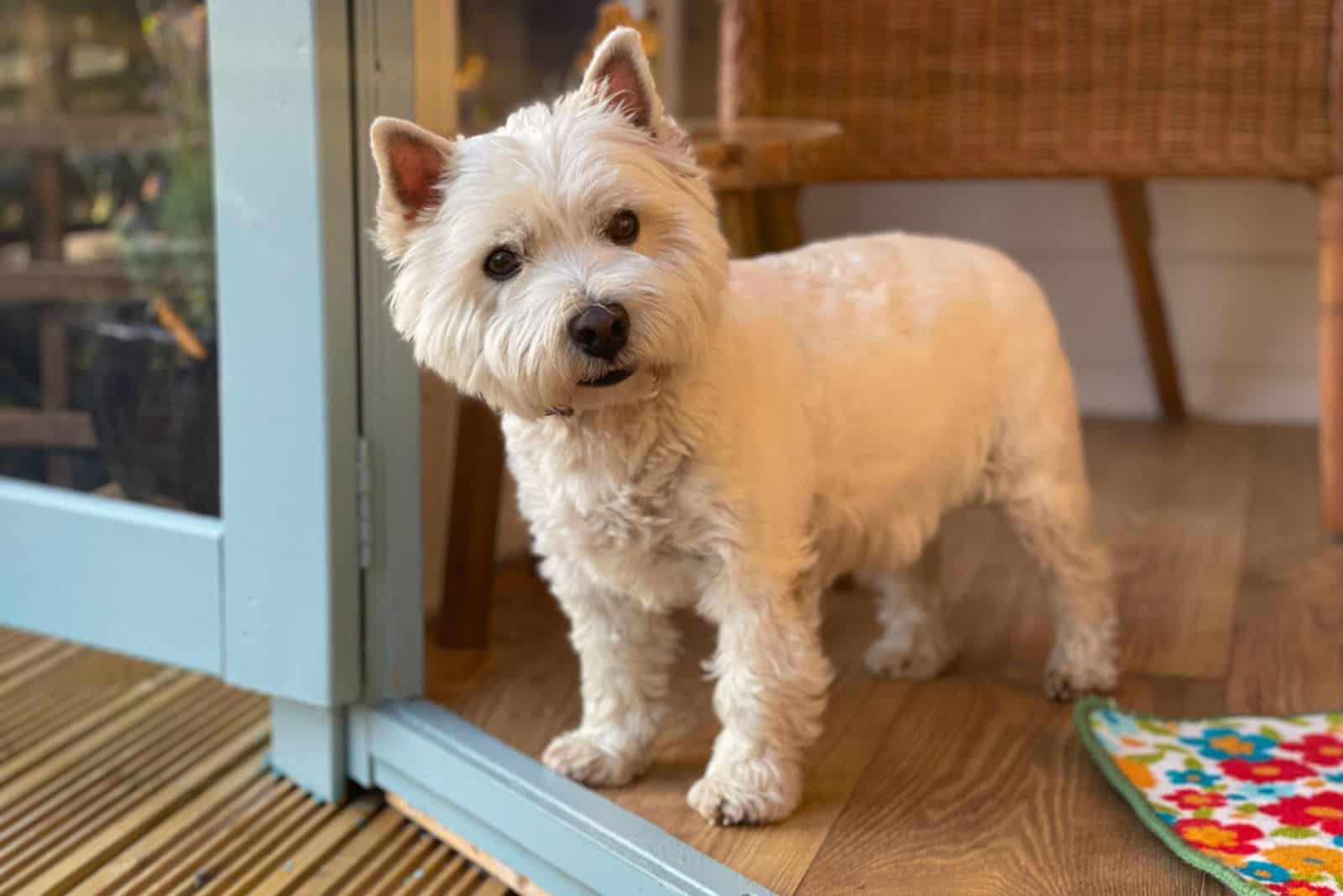It can’t be pleasant seeing your doggo walk up and down, going through the rooms, or going around in a room like he’s in a cage. We love our dogs, and seeing them like this makes us worried.
That is reasonable! But, don’t stress a lot just yet.
There could be numerous reasons why is a dog pacing around the house. Not every reason is a very serious one. Nonetheless, we have to take precautions and see the problem from all sides.
If you are truly worried and nothing can ease your mind — taking your dog to the vet is the best option. But, remember that most dogs don’t really enjoy going to the vet, especially if they had a bad experience.
So, if you can save your doggo from going on the dreaded trip, and you can see there are no obvious signs of a health issue, then there are some things we can try to do at home.
If you’ve ever asked yourself: my dog is pacing and won’t lie down – what should I do? — you’ve come to the right place.
First, let’s see the possible reasons behind such odd behavior.
My Dog Is Pacing And Won’t Lie Down

There are so many reasons for this type of behavior. We’ve summarized them all and put them in nine large groups. In general, we can say that almost any medical issue can lead to a situation where your dog is pacing and won’t lie down.
So, we can make this list as long as you want, but let’s keep it serious and direct. From a simple health problem that can be solved in an instant to more serious problems regarding your dog’s health — it’s all here.
These lists are for informational purposes, and are not a precise diagnostic of your dog’s health. We can’t see your dog, and we can not examine it. This is just to point you in the right direction or to help you worry less because we’ve seen it all.
Dogs sometimes start behaving weirdly all of a sudden, and we have no idea why! Instead of rushing to the vet for every little thing your doggo does, let’s read about what might be the cause. Once you recognize the symptoms, you can decide whether to take the dog to the vet or stay at home.
We will highlight those symptoms that imply a dog has health issues that need vet care. Even if you do recognize such symptoms in your dog, that still does not mean there is something serious at hand.
We are covering all sides because we love our pups! But, clinical examination is key to a successful diagnosis. Leave the phobias behind and wait for your vet to tell you if something is wrong — or not!
So, what is the reason behind this odd behavior? What a strange doggo you are.
1. Dog Feels Pain

A dog is a mammal with a developed nervous system. That means they can feel all kinds of sensations coming from their peripheral nerves.
Just like they can feel our touch or a boop on the nose, they can feel pain, too. From the nerves back to the central nervous system — ouch! Pain can either be acute or chronic. Acute pain is more severe, but it does not last long.
Acute pain is the type of pain we all feel when we stub our toe or when we accidentally touch a hot stove. And, the other type of pain is the one that lasts longer… like a constant headache. It doesn’t have to be strong, but it interferes with our everyday life.
A dog that feels pain, chronic or acute, can start pacing tirelessly. Why? They don’t know what to do with the pain they feel. They can’t get comfortable because a part of their body is sending signals to the brain that say – it hurts, it hurts!
We act in a similar way. We can’t just lie down and sleep as if nothing is happening. We look for help, but dogs don’t know how to do that. Well, they can’t do that.
They do not communicate the same way we do, nor do they realize we can help them. It would be best if we could understand the whimpering or barking of our doggies.
So, yes… first on our list is — my dog is pacing and won’t lie down because of pain. This is actually one of the most common reasons why a dog keeps pacing.
If you want to, you can dig deeper into your dog’s behavior to see what is actually happening. Is your dog pacing all the time or is your dog restless at night, and you feel as if it has been walking all night long?
What Can Cause Pain?
If it is pain that is bothering your dog, there are various reasons why a dog could feel this way. We will talk about life-threatening health issues later. These more serious health issues have more symptoms, not just pain.
For now, we will show you some of the problems that are not life-threatening and problems that are less serious that can cause pain and stop your dog from lying down.
- Joint problems (hip dysplasia, elbow dysplasia)
- Gasses
- Upset stomach
- Foreign body (stuck in the skin or deeper)
- Dental problems
- Problems with the nasal cavity
- Claw problems (check if the nail quick has been hurt)
Of course, if you notice that your dog has a problem breathing or eating, or if he is limping excessively — a trip to the vet is a must.
2. Dog Is Excited

So, a dog can feel pain, but it could be something as simple as — he is excited! Did you say some magic words to your dog, like walkies, park, or toy?
We’ve all seen videos where dog owners film their furry friends reacting to certain words and getting excited. They start jumping and wagging their tail so much that they cause a tiny hurricane! You do not want to stand behind a Golden Retriever’s tail when they are excited!
Their tail comes alive and knocks down or slaps everything around them. But, not all dogs are the same. Some might be more excited than others.
They can start pacing around, and that pacing can turn into zoomies! Now, that is a sight to see. Just watch out if you have a big dog like a Great Dane or a German Shepherd. A dog might not stop pacing and zooming around, and just sit down, but you might!
As a pet parent, I can confirm — dogs do crazy things when they are excited. The second reason is this — my dog is pacing and won’t lie down because he is excited!
You can check other signs that tell you your dog is excited about something or someone:
- They are not keeping their body stiff while pacing
- Their tongue is hanging out
- They wag their tail (a lot)
- They keep their tail high
One of the best tell-tale signs a dog is very excited or not excited at all is a dog tail position chart. I like to think of a dog’s tail as a person’s eyebrows. We can tell so much by looking at the dog’s tail position, just like we can by looking at one’s eyebrow position or movement.
Types of Excitement
Not every type of excitement is the same. Here are some possible excitement triggers:
- There could be someone at the door, but no one seems to pay attention to it but the dog.
- They might have smelled something — they do have an amazing sense of smell.
- They heard something that got them excited — a word we said or a noise outside.
Also, we must separate the two types of excitement and pacing:
- Happy and excited.
- Alert and excited.
The first one is what we’ve been talking about. The latter is one we’re going to explain now.
A dog that is excitedly pacing around the house because it’s alert has sensed something. Let’s call it the sixth sense (not like the movie with Bruce Willis… or, I hope not) — a dog smelled, heard, or got a tingle down its spine.
That means alert time… let’s check the territory and pace around. This is especially common with guard dogs — Dobermans, German Shepherds, or any other big guard dog or small, but feisty guard dog!
Whatever the reason is, I recommend joining your dog. Ask him what he is doing (many times) and just pace around. It might turn into a game, and they will calm down.
3. Dog Is Losing Eyesight

Pacing is a behavioral issue in dogs. They do it most of the time because of an underlying physiological problem, but the outcome is psychological — they are pacing because something is happening and they don’t know what.
It is often subconscious and similar to our pacing when we are on the phone having a conversation with someone important. Some people pace and some scribble on paper without even noticing it.
That is the same issue with dogs, and our third reason, called — my dog is pacing and won’t lie down because it is losing its eyesight.
It is safe to assume that it can be very difficult for a dog to start losing its eyesight. It is difficult for anyone, but dogs don’t have the same perception of illnesses and how they happen as we do. If a dog starts losing its sight, it is a shock that we cannot understand unless we enter their doggie brain.
They can act in different ways. Some dogs will stay quiet and calm, scared of what is happening. Others might start pacing around in order to “clear the view”.
Eye Problems Leading To Blindness
We often connect sight loss with older dogs. And, that is true in a certain way. The older the body is, the more things ought to happen. But, losing eyesight and blindness doesn’t have to be connected to the dog’s age.
A young dog can have health issues that could lead to blindness. The condition could be hereditary, in which case the issue could happen at any time.
Let’s see some of the eye problems that could lead to partial or complete blindness:
- Progressive retinal atrophy
- Glaucoma
- Cataracts
- SARDS (sudden acquired retinal degeneration)
- Brain tumor
Sometimes, a seemingly simple issue can lead to partial or complete loss of sight. A dog can hurt itself, it could have entropion, or even an untreated eye infection.
When vision starts to blur, a dog tries to do whatever he thinks is the best solution. Or, it can start doing subconscious actions like pacing without lying down.
How Do You Check A Dog’s Eyesight?
You don’t have to have a special machine that will help you see your doggo’s macula or do a checkup of its optical nerve. We can do a simple, yet effective trick called — throw the ball.
Of course, you are not trying to hit your dog with a ball. You just want to see if it notices a ball coming toward or passing by it. If a dog has that indifferent look as if nothing happened — it’s time to see the vet.
You can try this several times just to make sure. When you take your dog to the vet, you will get professional treatment options and the answer to your question: what now?
4. Dog Is Bored

This can happen to any type of dog, but it is more common in intelligent dog breeds, like Poodles and Border Collies, especially if they are also a very active dog!
Don’t get me wrong, this can happen to a Bulldog or a Chihuahua, too. But, most of the time, low-maintenance dogs are not very prone to pacing because they are bored. On the other hand, imagine a very active and intelligent Border Collie that simply has to do something!
But, there is no one around! There is no one to play with because everyone is either outside the home or everyone is busy at home. So, a dog’s gotta do what a dog’s gotta do. They make their family members scratch their head and wonder, why is my dog pacing?
That’s why we have the fourth reason for such behavior — my dog is pacing and won’t lie down because it’s bored!
I know you have to work late or you have a lot to do almost every day, but you can take a short break every now and then and play for a few minutes with your dog. If you cannot spare some extra time for your bored doggo, then buying them some interactive dog toys can be a good solution.
5. Mating Issue

It is that time of the year. The pheromones are in the air and your dog is starting to change its behavior. It doesn’t matter if you have a male or a female dog, a change will happen.
There are certain ways to tell if your male dog has mating needs. One of them is restlessness and an urge to roam. But, if we don’t let our dogs go out on their own, they will have no other choice but to pace around without any desire to stop and lie down.
They can’t help themselves — it is a physiological need of intact males that cannot be solved other than neutering your dog.
Even females show some obvious signs they are in heat — female dogs can hump the air, too. And, they will also act as if they have somewhere important to go, but we won’t let them outside. So, they start to pace.
The mating issue is a big issue in kennels. Of course, any pet owner who has more than one dog that is not spayed or neutered will have puppy problems as well if they don’t keep the dog separated.
But, at least it is something that can be solved. What can be solved? The reason under the name — my dog is pacing and won’t lie down because it wants to mate!
6. Dog Is Stressed

Stress is something that can affect our furry friends, too. They are not immune to stressful situations. Actually, some dogs get stressed when the schedule they got used to as puppies gets changed.
If you had a certain schedule for years, and suddenly, you had to change it, it might take some time for your doggo to get used to it. They can feel stressed because something so familiar has changed, and they might start showing their stress by pacing.
Something else could be behind this behavior. Maybe some loud noises scared him? This is something that happens a lot when there are a lot of fireworks. ‘Tis the season is not an excuse for scaring animals.
Stress that turns into a chronic occurrence can lead to anxiety disorder… not just separation anxiety that we will talk about, but anxiety about almost anything new your dog encounters. You will certainly notice some signs of such behavioral disorders.
A potty-trained dog can all of a sudden start pooping in the house. Or, a well-socialized dog can start behaving as if it never had proper socialization. They will become reserved or even aggressive toward other dogs and strangers.
This change can lead to poor overall quality of life. A stressed dog might avoid food or it can have a loss of appetite. There are so many ways that stress symptoms can show up in a dog. The important thing is to notice your dog’s change in behavior.
Once you realize that something is wrong, it is time to take the dog to the vet.
Can I Help My Dog?
The short answer is — yes.
But, it is not that simple. You can’t just play some Enya music to your doggo and expect things to work themselves out.
A stressed dog will need a lot of gentle care and patience. They are already scared or nervous, so additional stress is absolutely out of the way. Avoid changes in the schedule if it’s possible. Also, remove anything that can trigger your dog’s sense of smell.
We are trying to calm them down, so keep their senses free of excessive stimulants. And, give your dog a lot of support. Show him you are there for him, and that everything is alright.
If this behavior persists, take your dog to the vet to find out if there is something else that is triggering such behavior in your dog.
7. Dog Is Hungry

If everything is alright medically-speaking, then this is something that happens when we get ourselves a new puppy or a new dog, and we are still not used to how much and when to feed him or her.
It is OK not to have all the answers right away. I am certain you are feeding your doggo, maybe even too much! But, remember that dogs need a daily amount of food depending on their age and health.
There are a lot of feeding charts you can check to see if you are feeding your dog the right way. Whether you are looking for a feeding chart for a Presa Canario or you are looking for a chart for your new Shih Tzu, the result is the same — you will help your dog’s growth and development.
And, a hungry dog is a solid reason. A dog is a creature led by instincts, and when their stomach is empty, they do what they are instinctually programmed to do — roam and look for food.
Of course, our doggies can’t just go out and look for food. But, they can pace to ease their mind. A dog that keeps pacing because it’s hungry doesn’t have to mean it didn’t eat anything. They could have parasitic infection problems or they may be lacking some vitamins.
There are other medical reasons behind your dog’s constant hunger. Pay attention to your dog’s weight. Is it losing or gaining weight? If it is eating a lot, but seems to be losing weight — there is a health issue at hand. In most cases, it is a worm infestation.
What Can I Do?
The first thing is to take your dog to the vet. If your dog is always hungry, pacing nervously looking for food, and not gaining weight, but losing it — it is vet time!
The first step is a clinical examination — the vet will check your dog’s abdomen, check its temperature, and look for other general signs of parasitic infestation or other abnormalities in the dog’s appearance.
If the vet cannot conclude it is a parasitic infection like worms, the next step is a blood test. This can tell us all about the dog’s health status. After the examination, the vet can recommend a diet change or supplements to boost your dog’s immune system.
8. Dog Has Separation Anxiety

We already mentioned that a stressed dog can become anxious and develop some kind of anxiety disorder. One of these disorders is separation anxiety.
This simply means that your dog loves you so much that it doesn’t want to leave your side. It wants to be with you all the time. If you’ve ever had a dog that won’t leave your side, you truly understand what it means to have a doggo that follows you like a shadow wherever you go.
But, you have to put yourself in their perspective. You either never left it alone when it was a puppy, and now it expects the same thing when it is an adult, or it got scared or anxious about something, and it is looking for you to comfort it.
This is why it is important to get your puppy used to all kinds of situations while it is still a puppy. This is also a part of proper early socialization of dogs. Of course, you are there for your dog, but it has to learn to be alone for a while, too.
Are Some Dog Breeds Prone To Separation Anxiety?
There are some breeds that are more likely to suffer from separation anxiety than other dog breeds. In most cases, a dog breed that is more prone to it comes from a hunting dog group.
This is not hard to fathom if you think about the way hunting dogs were bred to work. They were bred to be a part of the pack. They were literally made to rely on each other to survive and successfully find food.
No, our dogs don’t have to hunt like that anymore, but they still have the instinct of a hunter. It’s like saying a Border Collie doesn’t have to herd anymore.
So, the direct answer is — yes, some dog breeds are more prone to suffer from separation anxiety. Have you ever wondered why Dachshunds are so needy? One explanation is that they are hunting dogs!
Here are some other dog breeds that could develop a separation anxiety problem:
- Labrador Retriever
- Chihuahua
- Greyhound
- Cocker Spaniel
9. Dog Has Health Issues

And, the last on our list is a very vague reason — my dog is pacing and won’t lie down because it has health issues.
It is vague because of so many health issues that could lead to a dog’s pacing behavior. Your dog might have some neurological problems, it could have hurt itself, or it could be a problem with one of its body organs.
Take out the veterinary anatomy book and randomly point at any organ of a dog. Did you point at a dog’s eye, bladder, liver, or heart? Any medical problem can lead to restlessness and pacing behavior.
This doesn’t mean it will, but it can.
Here are some health issues that can lead to pacing in dogs:
- Dementia
- Problems with the pancreas (Pancreatitis)
- Problems with the liver
- Cushing’s disease
- Bloat
These are the more serious health issues we talked about earlier. None of these health problems can be solved with a home remedy, a relaxation technique, or a simple change of diet. These diseases require professional services.
Taking your dog to the vet is the only option to help your dog when it comes to some of the mentioned diseases, especially bloat (Gastric Dilatation — Volvulus).
Your vet can do all the necessary examinations on your dog, from checking its eyes to taking X-rays if needed.
See Also: How To Comfort A Dog With Pancreatitis: Remedies & Relief
The Conclusion
You picked up your phone and dialed the number of your vet. They pick up, and you say: My dog is pacing and won’t lie down! What’s wrong?
The first thing a vet will tell you is to calm down and check if your doggo has some obvious signs it’s in pain. They will also ask you if it’s something your dog does a lot or if it’s a new behavior.
They will also probably tell you to observe the dog overnight and bring it to the vet station if nothing changes. But, while you wait for the longest night to pass — you read this! And, it is easier now that you have information about the topic you are experiencing at the moment.
Chances are your dog is alright. And, you are doing all that is in your power to keep your furry family member safe and in good health.
That’s why you are here, soaking up this information so that you can help calm down both you and your dog. And, you are doing an amazing job!
